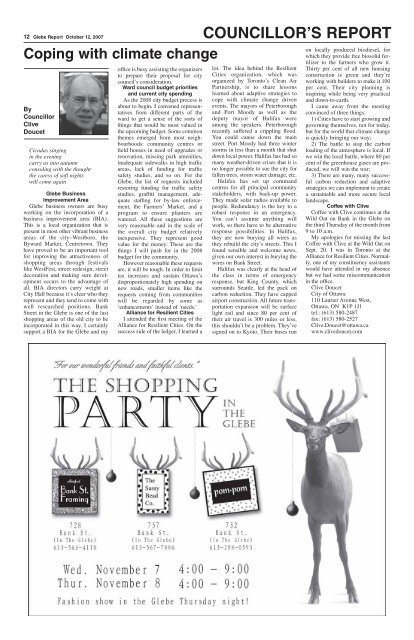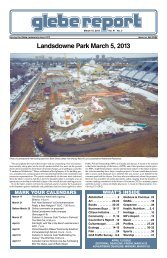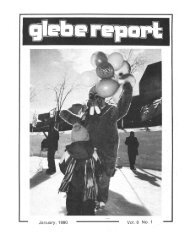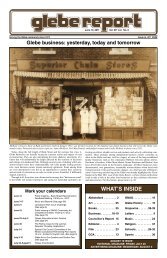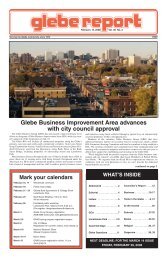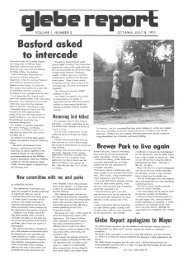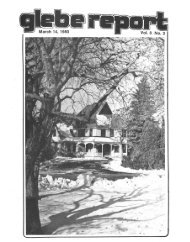October, 2007 - Glebe Report
October, 2007 - Glebe Report
October, 2007 - Glebe Report
Create successful ePaper yourself
Turn your PDF publications into a flip-book with our unique Google optimized e-Paper software.
12 <strong>Glebe</strong> <strong>Report</strong> <strong>October</strong> 12, <strong>2007</strong> COUNCILLOR’S REPORT<br />
Coping with climate change<br />
By<br />
Councillor<br />
Clive<br />
Doucet<br />
Cicadas singing<br />
in the evening<br />
carry us into autumn<br />
consoling with the thought<br />
the caress of soft nights<br />
will come again<br />
<strong>Glebe</strong> Business<br />
Improvement Area<br />
<strong>Glebe</strong> business owners are busy<br />
working on the incorporation of a<br />
business improvement area (BIA).<br />
This is a local organization that is<br />
present in most other vibrant business<br />
areas of the city–Westboro, the<br />
Byward Market, Centretown. They<br />
have proved to be an important tool<br />
for improving the attractiveness of<br />
shopping areas through festivals<br />
like WestFest, street redesign, street<br />
decoration and making sure development<br />
occurs to the advantage of<br />
all. BIA directors carry weight at<br />
City Hall because it’s clear who they<br />
represent and they tend to come with<br />
well researched positions. Bank<br />
Street in the <strong>Glebe</strong> is one of the last<br />
shopping areas of the old city to be<br />
incorporated in this way. I certainly<br />
support a BIA for the <strong>Glebe</strong> and my<br />
office is busy assisting the organizers<br />
to prepare their proposal for city<br />
council’s consideration.<br />
Ward council budget priorities<br />
and current city spending<br />
As the 2008 city budget process is<br />
about to begin, I convened representatives<br />
from different parts of the<br />
ward to get a sense of the sorts of<br />
things that would be most valued in<br />
the upcoming budget. Some common<br />
themes emerged from most neighbourhoods:<br />
community centres or<br />
field houses in need of upgrades or<br />
renovation, missing park amenities,<br />
inadequate sidewalks in high traffic<br />
areas, lack of funding for traffic<br />
safety studies, and so on. For the<br />
<strong>Glebe</strong>, the list of requests included<br />
restoring funding for traffic safety<br />
studies, graffiti management, adequate<br />
staffing for by-law enforcement,<br />
the Farmers’ Market, and a<br />
program to ensure planters are<br />
watered. All these suggestions are<br />
very reasonable and in the scale of<br />
the overall city budget relatively<br />
inexpensive. They represent good<br />
value for the money. These are the<br />
things I will push for in the 2008<br />
budget for the community.<br />
However reasonable these requests<br />
are, it will be tough. In order to limit<br />
tax increases and sustain Ottawa’s<br />
disproportionately high spending on<br />
new roads, smaller items like the<br />
requests coming from communities<br />
will be regarded by some as<br />
‘enhancements’ instead of ‘needs.’<br />
Alliance for Resilient Cities<br />
I attended the first meeting of the<br />
Alliance for Resilient Cities. On the<br />
success side of the ledger, I learned a<br />
lot. The idea behind the Resilient<br />
Cities organization, which was<br />
organized by Toronto’s Clean Air<br />
Partnership, is to share lessons<br />
learned about adaptive strategies to<br />
cope with climate change driven<br />
events. The mayors of Peterborough<br />
and Port Moody as well as the<br />
deputy mayor of Halifax were<br />
among the speakers. Peterborough<br />
recently suffered a crippling flood.<br />
You could canoe down the main<br />
street. Port Moody had three winter<br />
storms in less than a month that shut<br />
down local power. Halifax has had so<br />
many weather-driven crises that it is<br />
no longer possible to sue the city for<br />
fallen trees, storm water damage, etc.<br />
Halifax has set up command<br />
centres for all principal community<br />
stakeholders, with back-up power.<br />
They made solar radios available to<br />
people. Redundancy is the key to a<br />
robust response in an emergency.<br />
You can’t assume anything will<br />
work, so there have to be alternative<br />
response possibilities. In Halifax,<br />
they are now burying all wires as<br />
they rebuild the city’s streets. This I<br />
found sensible and welcome news,<br />
given our own interest in burying the<br />
wires on Bank Street.<br />
Halifax was clearly at the head of<br />
the class in terms of emergency<br />
response, but King County, which<br />
surrounds Seattle, led the pack on<br />
carbon reduction. They have capped<br />
airport construction. All future transportation<br />
expansion will be surface<br />
light rail and since 80 per cent of<br />
their air travel is 300 miles or less,<br />
this shouldn’t be a problem. They’ve<br />
signed on to Kyoto. Their buses run<br />
on locally produced biodiesel, for<br />
which they provide free biosolid fertilizer<br />
to the farmers who grow it.<br />
Thirty per cent of all new housing<br />
construction is green and they’re<br />
working with builders to make it 100<br />
per cent. Their city planning is<br />
inspiring while being very practical<br />
and down-to-earth.<br />
I came away from the meeting<br />
convinced of three things:<br />
1) Cities have to start growing and<br />
governing themselves, not for today,<br />
but for the world that climate change<br />
is quickly bringing our way;<br />
2) The battle to stop the carbon<br />
loading of the atmosphere is local. If<br />
we win the local battle, where 80 per<br />
cent of the greenhouse gases are produced,<br />
we will win the war;<br />
3) There are many, many successful<br />
carbon reduction and adaptive<br />
strategies we can implement to create<br />
a sustainable and more secure local<br />
landscape.<br />
Coffee with Clive<br />
Coffee with Clive continues at the<br />
Wild Oat on Bank in the <strong>Glebe</strong> on<br />
the third Thursday of the month from<br />
9 to 10 a.m.<br />
My apologies for missing the last<br />
Coffee with Clive at the Wild Oat on<br />
Sept. 20. I was in Toronto at the<br />
Alliance for Resilient Cities. Normally,<br />
one of my constituency assistants<br />
would have attended in my absence<br />
but we had some miscommunication<br />
in the office.<br />
Clive Doucet<br />
City of Ottawa<br />
110 Laurier Avenue West,<br />
Ottawa, ON K1P 1J1<br />
tel.: (613) 580-2487<br />
fax: (613) 580-2527<br />
Clive.Doucet@ottawa.ca<br />
www.clivedoucet.com


